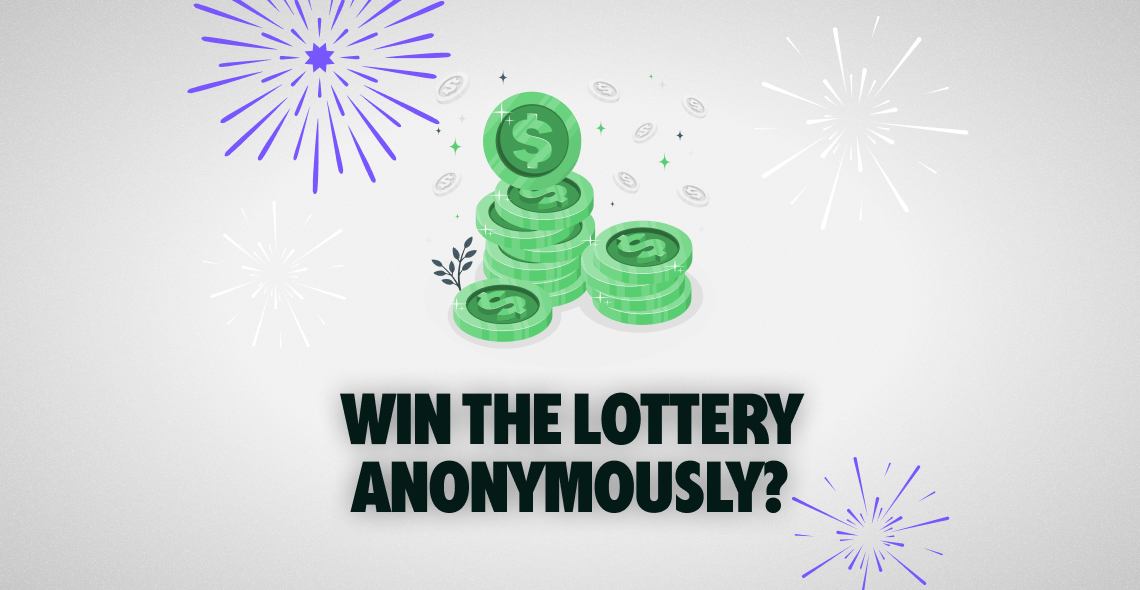Can You Win The Lottery Anonymously?
Written by Jackpot Staff
May 23, 2024

Winning the lottery can be a life-changing experience, bringing an influx of wealth and newfound opportunities. But with this windfall comes the daunting task of managing the newfound fortune and the attention that comes with it. One question that often arises is whether it is possible to win the lottery anonymously. In this article, we will explore the concept of lottery anonymity, its legal implications, as well as its pros and cons. We will also delve into the steps one can take to claim lottery winnings anonymously while staying protected from potential scams.
What Is Lottery Anonymity?
Lottery anonymity refers to the ability of lottery winners to keep their identities undisclosed to the public. Traditionally, lottery winners were required to reveal themselves to claim their prizes, but an increasing number of states have started giving winners the option to remain anonymous. This enables winners to protect their privacy and avoid the potential downsides associated with sudden, public wealth.
Winning the lottery is a life-changing event that can bring both joy and challenges. Anonymity in lottery winnings has become a topic of interest and debate among policymakers, lottery officials, and the public. The shift towards allowing winners to remain anonymous reflects a growing recognition of the need to balance the excitement of winning with the need for privacy and security.
Why Lottery Winners Choose Anonymity
There are various reasons why lottery winners opt for anonymity. One primary motivation is to protect themselves and their loved ones from the potential negative consequences of sudden, publicly displayed wealth. By remaining anonymous, winners can reduce the risk of becoming targets for scams, fraud, or even harassment. Moreover, anonymity allows winners to maintain a sense of normalcy in their lives, shielding them from media scrutiny and unwanted solicitations.
For many winners, anonymity provides a sense of security and peace of mind. It allows them to control the narrative of their success and avoid the pressures that come with public recognition. By staying out of the spotlight, winners can focus on managing their finances, planning for the future, and adjusting to their new circumstances without the added stress of public attention.
State Laws on Lottery Anonymity
Currently, a limited number of states allow lottery winners to claim their prizes anonymously. It is worth noting, however, that these laws may be subject to change, and winners should stay informed about the specific regulations in their state of residence.
Currently, these states provide players with the opportunity to claim any lottery winnings anonymously:
- Delaware
- Kansas
- Maryland
- Mississippi
- Missouri
- Montana
- New Jersey
- South Carolina
- Wyoming
In addition, several other states allow for anonymous lottery winnings, but limit the anonymity to players who win based on a minimum threshold:
- 1. $10,000:
- Michigan
- Minnesota
- 2. $100,000:
- Arizona
- Ohio
- 3. $250,000:
- Georgia
- Illinois
- 4. $500,000:
- Arkansas
- 5. $1 million:
- Texas
- West Virginia
- 6. $10 million:
- Virginia
In states where anonymity is not guaranteed, winners may have the option to claim their prizes through legal entities such as trusts or limited liability companies (LLCs). These structures can help winners maintain a level of privacy by shielding their identities from the public while still complying with state regulations.
Federal Regulations on Lottery Anonymity
While there is no federal law that prohibits lottery winners from remaining anonymous, winners should be aware that their winnings could still become public under certain circumstances. If the lottery is operated by a state agency and receives federal funds, the Freedom of Information Act (FOIA) may apply, potentially requiring the release of winner information. It is crucial to consult legal professionals to ensure compliance with applicable federal regulations.
Additionally, winners who choose to remain anonymous must weigh the potential consequences of their decision. While anonymity offers protection, it may also limit opportunities for public recognition, charitable giving, or financial advice. Winners should carefully consider their priorities and consult with financial advisors to make informed choices about their newfound wealth.
Pros & Cons of Claiming Lottery Winnings Anonymously
When considering anonymity in lottery winnings, it is essential to weigh the pros and cons involved.
Lottery anonymity is a topic that sparks debate among winners and experts alike. While some choose to revel in the limelight of their newfound fortune, others opt for a more discreet approach to safeguard their privacy and security.
Benefits of Claiming Winnings Anonymously
Remaining anonymous offers several advantages to lottery winners. First and foremost, it provides heightened personal security by preventing unwanted attention and potential threats.
Anonymity allows winners to maintain their privacy, protecting them from scammers, long-lost friends and relatives, and even unscrupulous businesses seeking to exploit their newfound wealth.
Staying anonymous can also shield winners from the pressures of sudden fame and fortune. It allows them to make decisions about their wealth without external influence and to focus on their well-being and that of their loved ones without the distractions that often come with public exposure.
Drawbacks of Lottery Anonymity
While anonymity can provide numerous benefits, it also has its drawbacks. One significant disadvantage is the missed opportunity to serve as a public role model or engage in philanthropy openly.
By remaining anonymous, winners forego the chance to inspire others or make a positive impact on communities through their stories of success. Additionally, anonymity may lead to speculation and rumors, potentially causing skepticism among the public.
Furthermore, choosing to remain anonymous can sometimes create a sense of isolation for winners. Without the support and camaraderie of fellow winners or the ability to share their experiences openly, some may find it challenging to navigate the complexities of their new financial status alone.
How To Claim Lottery Winnings Anonymously
If you are lucky enough to win the lottery and wish to remain anonymous, there are specific steps you should take to ensure a smooth and secure process.
Before Claiming Your Winnings
Prior to claiming your prize, consider consulting with legal and financial professionals who specialize in lottery winnings. They can provide valuable guidance on the most secure and legal means to claim your prize anonymously. It is essential to understand the specific regulations in your jurisdiction and any potential federal obligations you may have. By seeking professional advice, you can navigate the process with confidence and protect yourself from any potential pitfalls.
Claiming Lottery Winnings Anonymously
The process of claiming lottery winnings anonymously varies across different states. Familiarize yourself with the specific requirements in your state of residence.
For example, in some states, winners may need to create a legal entity or use a trust to claim their prize. This allows them to receive the winnings without revealing their personal information publicly.
In contrast, states that do offer anonymity automatically will only release the winner’s personal information after written permission has been provided by the winner. For example, in Virginia, winners of prizes greater than $10 million can claim prizes anonymously and will only release personal information when written permission is provided.
In either situation, it is crucial to follow the recommended procedures outlined by your state’s regulatory agency and consult professionals to ensure compliance throughout the claiming process.

